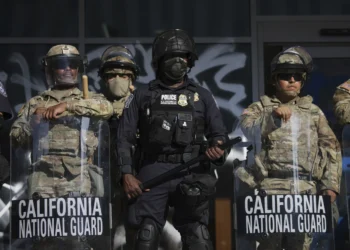President Donald Trump wasn’t on the ballot for Monday’s federal elections in Canada, but the vote was all about him. There’s no doubt that Trump was the loser, as much as Canada’s disappointed Conservatives were. Prime Minister Mark Carney and his ruling Liberal Party came from behind to triumph by running against Trump.
However, the real winner in Canada’s voting wasn’t the Liberals: It was China.
Until Trump brusquely inserted himself into Canadian politics since his return to the White House 100 days ago, Conservatives seemed poised to cruise to victory and end a decade of Liberal rule in Ottawa. Polling for months placed the Conservative Party firmly in the lead, guided by the youthful and politically adroit Pierre Poilievre. Then, Trump changed the game by repeatedly taunting Canada on social media with threats to make Canada our “51st state.” Carney claimed that Trump meant this seriously and had even told him about such a plan. This outraged Canadians and gave the ailing Liberals an opening against the Conservatives. Carney ran against Trump and his threats more than against Poilievre, which is why the Liberals just won a fourth straight election.
This is a serious setback for MAGA’s international ambitions. Trump’s impudent intervention in Canadian politics proved toxic, boosting the anti-American Liberals at the expense of the pro-American Conservatives. Trump doesn’t bear all the blame for the defeat. Canadians forfeited the chance to undo the political and economic damage wrought by a decade of Liberal rule, including erosion of Canadian prosperity amid record immigration.
Above all, however, Poilievre’s downfall robs Canada of an overdue opportunity to rid the country of pervasive Chinese political influence. During former Prime Minister Justin Trudeau’s decade in power, the Chinese Communist Party consolidated its prominent position inside the Liberal Party at both the federal and provincial levels. This is a decadeslong covert espionage-influence campaign executed by Beijing, employing spies, political operatives, businesspeople, and organized crime cadres acting in insidious concert to subvert Canadian democracy.
Canadian intelligence issued a stern classified warning about this unconventional threat in 1997, but Ottawa did nothing to push back. Now, after Trudeau’s decade of CCP-friendly rule, Beijing’s stranglehold over the Liberals appears so strong as to be unchallengeable.
Troubling signs mounted for years as Chinese immigrants, including CCP spies and operatives, burrowed their way into the Liberal Party across Canada, from the ground up. Mounting problems were ignored or hushed up. In 2010, the Canadian Security Intelligence Service attempted to warn Liberals that one of their provincial politicians, Michael Chan, then a minister in the government of Ontario, appeared to be a Chinese spy. Liberals did nothing, and Chan sued the newspaper that reported the CSIS finding. Chan remains active in politics to this day, continuing his questionable ties to Beijing while denouncing the CSIS as “racist.”
Beijing’s operatives from the United Front Work Department, the CCP’s overseas political action wing, have burrowed into Liberal ranks across Canada. As the muckraking Canadian journalist Sam Cooper has demonstrated in his extensive reporting, the lines between UFWD operations and Liberal Party electioneering have gotten disturbingly blurry. Evidence grew so overwhelming that in 2022, Trudeau denounced China’s “aggressive” interference in Canadian democracy, while thwarting efforts to remedy the situation.
Carney promises more of the same, perhaps worse. CCP operatives boosted him and his party during the election campaign while some Liberal candidates openly struck a pro-Beijing pose. The CCP is unafraid to influence politics in Canada, including intimidating their enemies there, knowing that Liberals won’t, perhaps now, can’t, push back.
WILL TRUMP LET PUTIN PLAY HIM WITH CEASEFIRE BLUFF?
Carney is reputed to possess his own dubious ties to Beijing. A banker by trade, when Carney chaired Brookfield Asset Management, that firm received a quarter-billion-dollar loan from a Chinese state-run bank after he met with top officials in Beijing. Poilievre attempted to make Carney’s connections to the CCP a political issue, but it got drowned out by Trump’s actions.
“What did Mr. Carney, in his role as Trudeau’s economic adviser, offer to China?” the Conservative leader pointedly asked two months ago. Liberals have no need to answer that question after their win. It’s no surprise that China’s foreign ministry welcomed Carney’s victory by stating that Beijing stands “willing to develop China-Canada relations on the basis of mutual respect, equality, and mutual benefit.”
John R. Schindler served with the National Security Agency as a senior intelligence analyst and counterintelligence officer.
















